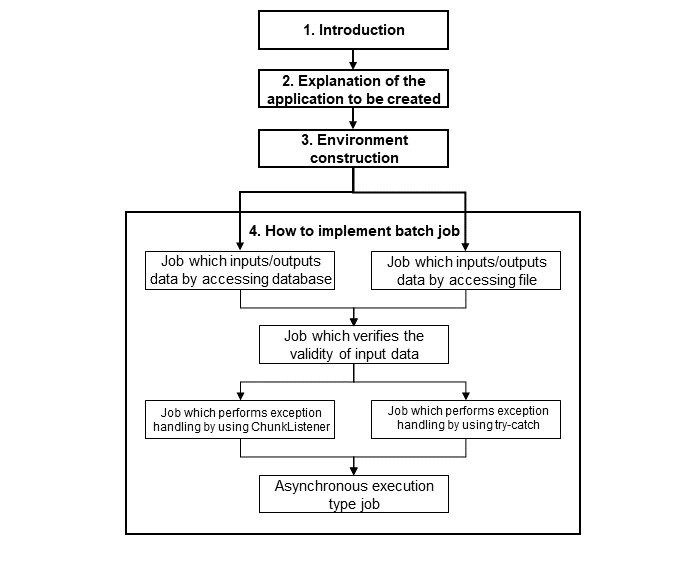Objective of the tutorial
This tutorial aims to achieve the basic knowledge of TERASOLUNA Batch 5.x by actually experiencing the development of the application based on the contents described in TERASOLUNA Batch 5.x Development guideline.
Target readers
This tutorial is written for architects and programmers who are experienced in software development and it is assumed that readers possess the following knowledge.
-
Basic knowledge of DI or AOP of Spring Framework
-
Basic knowledge of SQL
-
Experience of developing a Java-based application
Verification environment
Verification of environment conditions for this tutorials are shown as below.
| Software classification | Product name |
|---|---|
OS |
Windows 7 Professional SP1 (64bit) |
JDK |
openjdk-1.8.0.131.x86_64 |
IDE |
Spring Tool Suite 3.8.2 released |
Build Tool |
Apache Maven 3.3.9 |
RDBMS |
H2 Database 1.4.193 |
Overview of framework
Overview of processing model and architecture differences are explained here as the overview of framework.
For Spring Batch, refer Architecture of Spring Batch of TERASOLUNA Batch 5.x Development guideline for details.
Processing models offered by TERASOLUNA Batch 5.x include a chunk model and a tasklet model.
Respective features are explained below.
- Chunk model
-
A method which inputs/processes/outputs a certain number of data records together. This collection of data is called as a chunk. A job can be implemented by standardizing flow of processes like data input/processing/output and then implementing only a part of the process. It is used while processing a large amount of data effectively.
For details, refer Chunk model. - Tasklet model
-
A method which describes a process freely. It is used in simple cases like issuing SQL only once, issuing only command or in complex cases where it is difficult to standardize like accessing from multiple databases or files while processing.
For details, refer Tasklet model.
For the processing model, the components and functional differences are shown in the table below.
| Function | Chunk model | Tasklet model |
|---|---|---|
Components |
It consists of ItemReader, ItemProcessor, ItemWriter and ChunkOrientedTasklet |
It consists of Tasklet only. |
Transaction |
A transaction occurs for every chunk unit. Transaction control is only for the intermediate commit. |
Process is done by 1 transaction. Either a batch commit method or intermediate commit method can be used for transaction control. Former method uses a transaction control system of Spring Batch whereas the transaction is done directly by the user in the latter method. |
Recommended reprocessing methods |
Rerun and restart can be used. |
Generally, only rerun is used. |
Exception handling |
Exception handling can be easily performed by using a listener. It can also be implemented individually by using try-catch. |
Individual implementation by using try-catch is required. |
In this tutorial, how to implement a chunk model and a tasklet model is explained for the applications which use the basic functions. Since the implementation method varies according to architecture of chunk model and tasklet model, it is recommended to proceed further after completely understanding respective features of the model.
How to proceed with the tutorial
Since the applications (jobs) created in this tutorial consists of jobs created by adding implementations to created jobs, the sequence in which they are created must be considered.
How to read and proceed with this tutorial is shown in the figure below along with sequence relation of jobs to be created.

The asynchronous execution method job is assumed to be the last job in the order of the progress of this tutorial. However, if at least one job is created in the chunk model or tasklet model, the asynchronous execution method job may be executed.
|
Additional implementation of jobs which inputs/outputs data by accessing a file
Implementation is added based on Job which inputs/outputs data by accessing database, besides explanation of Job which inputs/outputs data by accessing the file and the execution example is displayed. When you want to add an implementation based on a job which inputs/outputs data by accessing a file, it must be remembered that it is necessary to read the same. |